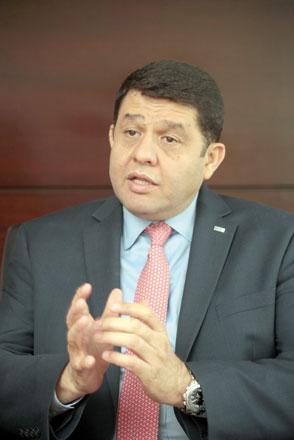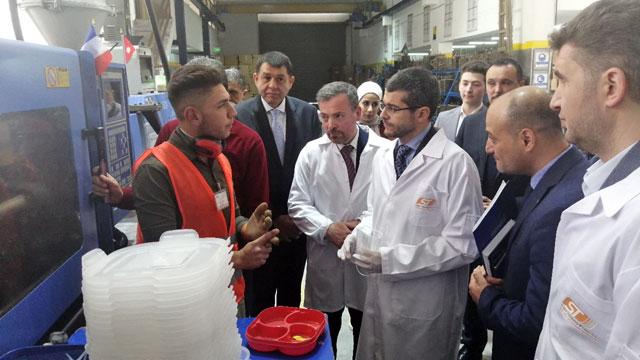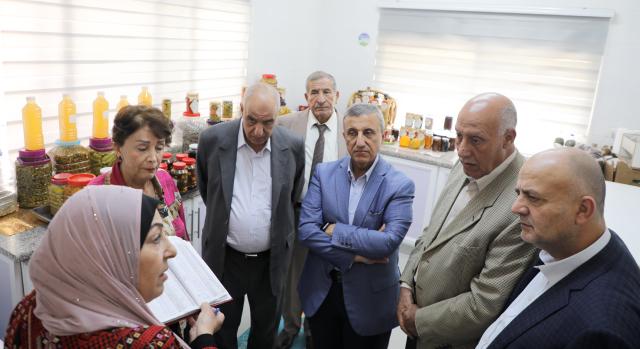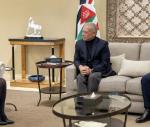You are here
BDC projects seek economic empowerment of refugees, host communities — CEO
By Maram Kayed - Jul 19,2020 - Last updated at Jul 19,2020

Nayef Stetieh
AMMAN — The Business Development Centre (BDC) has embarked on a slew of projects to “foster the economic status” of vulnerable Jordanians, and more recently Syrian refugees, according to the head of the centre.
“It was made clear to us in a post-COVID 19 world that those who have their own businesses are those who survive,” Nayef Stetieh, president and CEO of the BDC, told The Jordan Times in a recent interview.
It was mentioned that BDC’s “seven pillars” are youth empowerment, women empowerment, SME training and support, Syrian refugees and their host communities, vocational training and awareness-building.
“We like to target all of Jordan, but our focus is always on poverty-stricken areas,” said Stetieh.
Euromed Feminist Initiative has built in Jordan a consortium with the BDC and Tamkeen to implement the “strengthening access to protection, participation and services for women refugees and host communities” project, which is funded by the EU Regional Trust Fund in Response to the Syrian Crisis.
The overall objective is to “improve the livelihood, agency and legal and social protection for Syrian women refugees as well as for women in the host communities in Jordan”, according to information provided by the BDC.
This fund “strongly supports and provides both women refugees and vulnerable women in the host communities with grants to help them open their own businesses” in five different areas: Ajloun, Deir Alla, Jerash, Azraq and East Amman.
The project focuses on 3,000 of what the BDC described as “the most vulnerable” Syrian women refugees and women from host communities in selected areas by giving them “capacity-building skills for employment and self-employment.”
A “unique” aspect of the project is training these women in employability skills such as marketing and sales, home maintenance, hospitality, vocational training in beauty care, event planning and photography, which the BDC said was “to enable the trained women and build their competences to be able to support themselves by being productive”.
A story of a woman whom the BDC built a kitchen from scratch as to enable her to provide for her family after the death of her husband is one that Stetieh said “should be showcased as a success story”.
Another story is one of a woman who applied for help to renovate and restructure an old gym in Kofranjeh, Ajloun. The BDC noted that the gym is currently operating at “full capacity and carrying out three-shifts per day”.
“If someone were to pitch a women’s gym in Kofranjeh, one of the most poverty-stricken areas in the Kingdom, you would think they are crazy, but this woman was able to transform this idea into a very busy, successful business,” Stetieh noted.
On a separate note, the BDC team told The Jordan Times that women empowerment is a “cross-cutting theme in all BDC projects”, in the sense that all projects mandate that at least 50 per cent of participants are women.
They also mentioned that any training given by the BDC “ensures that its language is gender-inclusive”.
The second project, Tanmyeh: Access to Vocational Education and Development, is funded by the French Development Agency’s Minka Middle East Initiative, that aims to “improve the livelihoods of vulnerable groups amongst Syrian refugees and the host population through improved access to employment”.
The project provides technical and vocational training to 2,000 Jordanian and Syrian refugee youth over three years in order to “improve their employability in the manufacturing sector in line with labour market needs and potential employers”. Up to 70 per cent of the project’s graduates will be matchmade with Jordanian SMEs at the end of the project, according to the centre.
The Emergency Economic Response to COVID-19 Programme funded by UNICEF to support affected communities all over Jordan with a focus on the south through cooperating with local organisations is another project by the centre.
Its aim is to “reach out to the most affected families to provide the necessary needs or equipment that will assist them to cover their needs now and in the future”, according to Stetieh.
Breaking the stigma surrounding women working is an “important part” of the BDC’s work, according to Stetieh, with the centre engaging with the community and lobbying with these women’s parents if needed.
The national programme for self-employment “Inhad” enables the youth to establish their own businesses through providing them with technical and financial support in addition to networking them with the business ecosystem.
The programme is funded by UNICEF in partnership with the Ministry of Planning, the International Cooperation Productivity Enhancing Centre, the Central Bank of Jordan and the Association of Banks.
The project’s outreach and participant’s selection is based on “clear criteria set by experts”, as it “provides entrepreneurship capacity-building programmes and access to finance workshops in addition to future follow up on business progress”, noted Stetieh.
Focusing on gender equality and increasing the potential opportunity of engaging women in business, Inhad’s total number of applications reached 11,000 since the beginning of 2020 in all the Kingdom’s governorates.
In terms of green projects, the BDC, in partnership with Regional Activity Centre for Sustainable Consumption and Production is holding a Green Entrepreneurship Business Development project in Jordan designed by SwitchMed and funded by the European Union.
The programme targets 120 green entrepreneurs from various governorates of the Kingdom, training and supporting them to acquire the practical skills they need in establishing their own green projects and incubating them in accelerators, business centres as well as providing them with financial support services.
Related Articles
AMMAN — French Ambassador to Jordan David Bertolotti and President of the Business Development Centre (BDC) Nayef Stetieh on Wednesday visit
AMMAN — A Jordanian Senate delegation, accompanied by UNICEF officials, visited a number of projects implemented by the Business
AMMAN — The national pact for employment represents mutual commitments between the government on one side and employers on the other, but "i


















